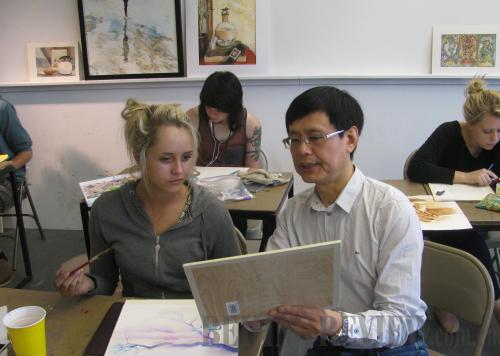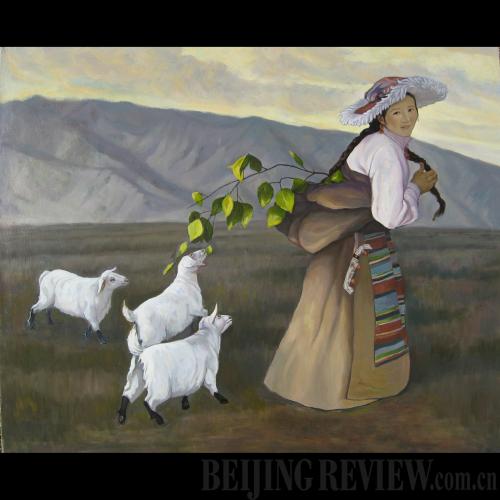|
 |
|
IN CLASS: Professor Wang Chun makes instructions on a student's painting (COURTESY OF WANG CHUN) |
Painter Chun Arthur Wang, a professor at the Columbus College of Art & Design in Ohio, first moved to the United States in 1992. Though he may speak English more than his native Mandarin and he may be living in the "West," a strong Eastern sentiment still pervades in his work.
During years of experimentation, Wang has developed his own style by combining traditional Chinese techniques with Western oil painting, gaining much praise from American artists in the process. His works are now sold to both private collectors and public institutions.
Art critic Ann Starr said Wang's paintings usher the audience into a quiet and peaceful world. Though she has never met the artist personally, she quickly sees Chinese cultural aesthetic presented in his paintings.
Wang's heart and stomach are firmly rooted in the East, his favorite spot in the United States being Chinatowns and his favorite dish, steamed fish head with diced hot red peppers from his hometown in central China's Hunan Province.
"The longer I remain in the States, the more I miss my own culture," he said.
 |
|
Green Temptation (COURTESY OF WANG CHUN) |
The Other Side of the Earth
Every time he returns to China, Wang visits the countryside. Beyond the vast and growing cities is where he draws his inspiration, particularly among China's 55 ethnic minorities.
In March, Wang held an exhibition in Muscatine County, Iowa, named The Other Side of the Earth.
"Instead of painting bustling cities, I chose to focus on the quiet and poetic life of minorities back home," he said. "I'm deeply concerned that culture, honesty, entrepreneurship, sincerity and compassion all deteriorate under the impact of consumerism."
In contrast to the West's focus on China's high-speed economic growth, Wang chose a less explored facet of local life.
"I have a strong preference for presenting the lives and cultures of minorities. Their mysterious religions, their gorgeous clothing and handicrafts and their strong family ties have all enthralled me," he continued.
"However, it's a great pity that with the fast growth of the economy and the expansion of cities, traditional cultures are disappearing at an alarmingly high speed," Wang said.
| 